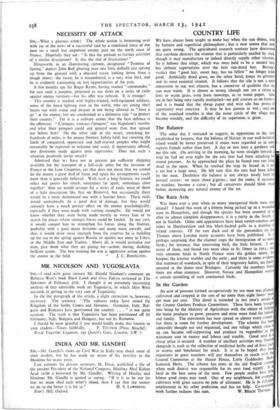NECESSITY OF ATTACK
Sac—What a glorious event! The whole nation is brimming over with joy at the news of a successful raid by a combined force of our men on a small but important enemy post on the north coast of France. Hopefully they ask: " Is this the prelude to further activities of a similar description? Is this the end of frustration? "
Illingworth, in an illuminating cartoon, designated " Promise of Spring," depicts John Bull gloating over one little daffodil just sprung up from the ground with a dejected raven looking down from a bough above: the raven, be it remembered, is a very wise bird, and he is evidently ruminating on lost opportunities of the past.
A few months ago Sir Roger Keyes, having trained " commandos " for just such a purpose, proposed to use them on a series of raids against enemy territory—but his offer was refused. It is strange!
This country is stacked with highly-trained, well-equipped soldiers, some of the finest fighting men in the world, who are eating their hearts out with ennui and despair at not being allowed to " have a go " at the enemy, but are condemned to a defensive role " to protect their country." Yet it is a military axiom that the best defence is the offensive. "L'attaque, toujours l'attaque," was Napoleon's maxim, and what finer prospect could any general want than that spread out before him? On the other side of the water, stretching for hundreds of miles, is the enemy frontier, lightly held, but covering the lands of conquered, oppressed and half-starved peoples who might reasonably be expected to welcome and assist, if opportunity offered, any diversions made against their oppressors. Does not such a situation positively invite attack?
Admitted that wa have not at present got sufficient shipping available for the transport of a full-scale army for the invasion of France or the Low Countries, yet that does not mean that we cannot do the enemy a great deal of harm and upset his arrangements vastly more than is generally believed. With such a long frontier, we could select our points for attack, sometimes far apart, sometimes close together: then we would arrange for a series of raids, most of them of a light description like that on Bruneval, but occasionally there would be a more determined one with a heavier force. These raids would undoubtedly do a good deal of damage, but they would certainly have a much greater effect on the enemy psychologically, especially if they were made with varying strengths. He would not know whether they were being made merely to worry him or to search for places where stronger forces could be landed. In any case, it would compel him to strengthen his forces along the frontier, probably with a good many divisions and many more aircraft, and thus it would draw away strength from the reserves he is building up for use in the spring against Russia, or against our army in Libya, or the Middle East and Turkey. Above all, it would revitalise our men, give them what they are pining for—action, daring, dashing, brilliant action. The best training for war is aggressive action against


























 Previous page
Previous page